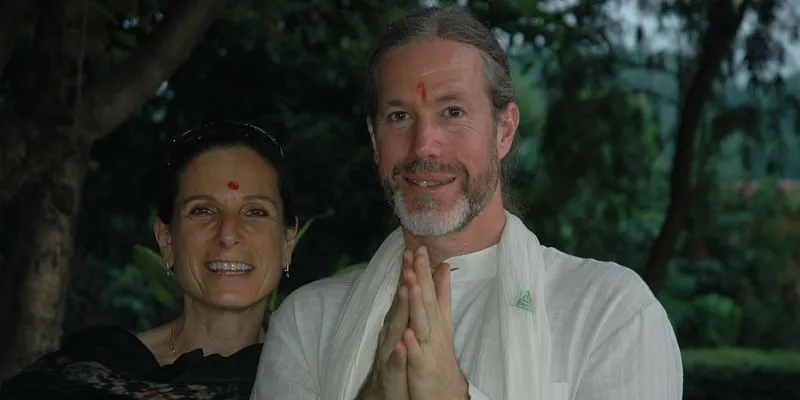40 countries, 2,500 farmers, 1 aim: how Organic India started with one product and built a Rs 357 Cr brand
Bharat Mitra and Bhavani Lev started Organic India to promote healthy, conscious living. Almost 25 years on, the company is one of the leading players in India’s organic industry, and has a presence in 40 countries.
Organic became the buzzword amidst the COVID-19 pandemic as immunity and wellness took centre stage.
But organic isn’t a new-fangled phenomenon – certainly not for Bharat Mitra and Bhavani Lev, who decided to start a movement to promote “true wellness” through a blend of herbs, spirituality, and Ayurveda.
After travelling across India to research the plethora of herbs, the duo launched Organic India in 1997 in Lucknow with an aim to “provide solutions for healthy, conscious living”.
Almost 25 years later, Organic India – one of the first organic brands from India - works with over 2,500 farmers, has more than 200 SKUs, and is present in 40 countries. In FY20, the company earned more than Rs 357 crore.
And to think that it all began with one product!
Subrata Dutta, Group Managing Director, Organic India, takes SMBStory through the journey of the brand, reveals how Organic India grew significantly in the last one year despite the successive lockdowns, and what lies ahead for the “organic industry”.
“Bharat and Bhavani saw what others saw 10 years later. They saw the future of the global environment, and decided to raise awareness about holistic living through Organic India,” Subrata says.

Bharat Mitra and Bhavani Lev, Co-founders, Organic India
The pandemic effect
COVID-19 significantly changed the perception of health and wellness among people across the country. The rising awareness of healthy and clean eating led to a huge demand for organic products.
According to IMARC, the Indian organic industry reached a value of $815 million in 2020, and is expected to grow at a CAGR of around 24 percent during 2021-2026.
Subrata says the brand has seen a behavioural change among consumers in the last one-and-half years and people have become “more conscious of what they use and what goes on their plate”.
Since 2020, Organic India has grown 35 percent and is poised for further growth.
However, things were not the same when the organic brand was launched.
“When we started, everyone was focused on boosting crop productivity. It was a battle to make farmers understand about conscious living because these things were not heard of then.”
The movement to create genuine organic products and solutions for people around the world has taken giant steps since then.
Making of Organic India
Organic India started by contracting small farmers from Azamgarh, a town near Lucknow, and just one product – tulsi tea.
The brand brought back to the forefront tulsi - an herb renowned in Ayurveda as a powerful adaptogen and for its stress-relieving benefits.
However, the initial days weren’t smooth for Bharat and Bhavani.
“When they approached farmers, they got a lot of questions. Farmers wanted to know why they should grow tulsi and not wheat. Wheat could assuage hunger, not tulsi,” Subrata says.

Bharat and Bhavani with farmers in tulsi plantation
It took some time for the couple duo to make farmers understand the value of organic farming, but they did.
Organic India worked with Azamgarh farmers for a decade and later formed small clusters in Rath near Hamirpur in Uttar Pradesh and Jalore in Rajasthan for larger tracts of land growing various organic crops. It also started working with farmers in Chittoor for mangoes.
The company now has more than 2,500 thriving farm partnerships.
Subrata says reaching out to customers was also a daunting process. Organic India did a lot of sampling of its teas and built word of mouth, which played a huge role in growing its customer base.
Growing the organic footprint
Organic India’s retail journey began in 1999 with general stores and modern trade distribution, which to date remains the primary channel of distribution. In the early 2000s, it retailed through Fabindia stores and in 2005 entered the ecommerce space to reach a larger customer base. At the same time, it also set up channels in the US and other countries.
In 2015, the brand began retailing through its own stores to provide a better brand experience for the wellness consumer. It opened its first store in New Delhi and at present, Organic India has 100 stores pan India.

Organic India's tea supplements and packaged food range
At present, Organic India offers more than 23 varieties of teas and infusions, and over 30 organic certified whole herb supplements in vegetarian capsules. This immunity-boosting range packages the benefits of turmeric, cinnamon, giloy, ashwagandha, and ginger.
The company, which procures all raw materials from local farmers, has recently launched personal care products and staples.
As a company, it follows the “profits with purpose” philosophy, but Subrata says the challenges in growing and sustaining such a business is managing sources and investing time/resources to build a credible, certified, and traceable origin to each product.
“Investing in farm to table and building value across the supply chain is key,” he says.
The future is greener
Subrata says organic used to be a niche market, but has become mainstream with people keen to adopt a healthy lifestyle.
Organic India competes with brands such as Twinings of London, Tetley, Lipton, and others, but Organic India is “obsessed with passion” and does not want to lose out on that by focusing on the competition.
The company recently invested more than Rs 100 crore in a state-of-the-art production facility on the outskirts of Lucknow. This facility can produce 25 million tea bags per month, Subrata says.
“We have a mission to help every household embrace ‘healthy conscious living' so organic food and solutions become a way of life,” Subrata says.
Organic India is working on new products and aims to “enhance its D2C presence and open more experience stores”.
Edited by Teja Lele









